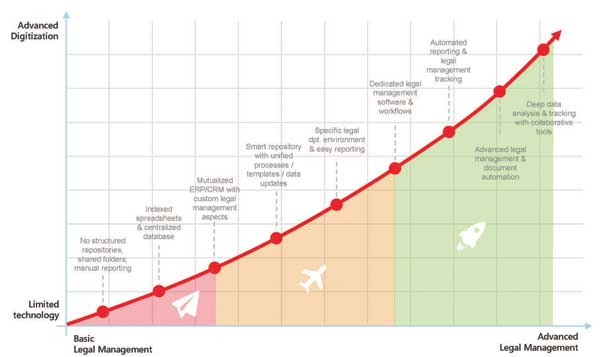Shay Ogunsanya of Legisway by Wolters Kluwer asks whether your legal department is operating in the most strategic way it can?
Does your legal department operate in the most strategic way possible? That is the question fuelling the impressive rise of the legal operations function in legal departments around the world.
Once solely focused on providing legal advice, today’s chief executive and board members expect that legal is managed like any other business unit. This means that legal department leaders need to find ways to maximise productivity, streamline processes and focus more on creating value. And, they must do it all while keeping a keen eye on costs.
The call to ‘do more with less’ has never been more persistent. But answering this call can be challenging for legal departments with limited resources.
Our Legisway portfolio for corporate legal departments (CLDs), comprised of Legisway Essentials and Legisway Enterprise, serves 1,000+ customers and 50,000+ users in Europe and the US. In this article by Legisway Essentials we’ll share our expertise on how legal departments can leverage technology to drive significant efficiency gains, control costs and deliver legal services in alignment with the priorities and goals of the company they serve. We highlight the main types of technology that can help your legal department as it grows so that you are better equipped to select the right fit for your needs.
What is legal operations?
Legal operations is a multi-disciplinary function that optimises the delivery of legal services. If you are part of a legal department, you are probably already dealing with legal operations, whether or not it is a dedicated function.
Regardless of the size, legal departments focus on two things. The first is legal work such as providing legal advice, managing litigation and/or performing contract review. The second is the strategic prioritisation of work, resource management, technology management, ensuring alignment with the companies’ goals, and so on. The latter is legal operations. Legal operations exists to remove the barriers that prevent in-house lawyers from getting things done. Whether it is through selecting technology or creating standard processes so colleagues do not need to reinvent the wheel, legal operations can be thought of as ‘the right-hand person’ empowering the legal counsel to spend more time on higher value activities.
The legal operations role can take on different forms depending on the size, maturity and budget of the legal department. Larger legal departments may employ a legal operations director to focus on running the business operations, a chief of staff to concentrate on the daily administrative needs of the law department, or a hybrid of both.
Regardless of how the function is executed, legal operations professionals may have a legal background, but skills like project management, data analysis and communication, and expertise in operational, financial and technology management are even more important. Their understanding of the core business coupled with their ability to translate the needs of the business into how the legal department works, helps legal deliver on its promise to protect and grow the business.
Adopting legal operations
Just because you cannot hire a dedicated legal operations function does not mean that you cannot benefit from the legal operations movement. With the right technology departments can shift and innovate from ‘legal as a cost centre’ to the new expectation of ‘legal as a value driver’. Legisway Essentials can support legal counsel in the biggest challenges they face on a daily basis.
Drive efficiency
To ‘do more with less’, legal departments need to be able to streamline work and improve productivity. Technology that centralises and structures legal data and documents saves you time searching for information, but it also allows the business to self-serve, while legal stays in control. Not only does this eliminate bottlenecks, but access to legal knowhow can improve risk awareness across the business.
Create value
To create value, legal departments must leverage the right resources for the right work at the right price. Technology can help you be an efficient project manager, even as your workload increases. Instead of re-inventing the wheel, you can standardise automated processes for routine projects, assign and prioritise tasks, and keep track of deadlines. By delegating administrative work to a software tool, you can spend more time on strategic matters that create value, like managing risk to increase business opportunities. Furthermore, you can free up more in-house manpower for work that might otherwise go to external legal counsel, a clear impact on the bottom line.
Generate insights
Finally, legal departments need access to business intelligence to inform data-driven decisions. Technology empowers legal departments to quickly pull together accurate reports on legal matters. Armed with insights to inform strategies to protect and grow the business, the legal counsel can elevate the position of legal and rise to the expectations of the chief executive and the board. Also, insights on legal department performance can help with multiple aspects of legal operations management, like resource allocation, vendor management, budgeting and more.
Choosing the right technology for your legal department
Often, when a business decides to invest in technology, the tendency is to select a solution to solve a single, specific problem. However, as the legal department evolves, changing needs and complexity often bring to light new requirements. For this reason, it is important to implement a solution that can adapt and extend across competencies as your legal operations matures. Before undertaking any initiatives with a high potential for improvement, it is important to firmly establish goals and objectives. Asking the following questions can help move in a direction that considers the size, maturity, and priorities of your legal department:
- Where can we be more effective and efficient?
- How can we simplify workflows within the legal department and between colleagues across the business?
- What kind of technology, people and processes do we need to help us accomplish our goals?
- What is our budget?
Once you have verbalised your goals and objectives, you want to look for technology that will meet your needs. As a rule, technology should empower you across competencies with:
- Centralised repository: is it easy to use? The more complex a solution is, the lower the chance people will actually start using it, and the longer the implementation takes.
- Collaboration and file-sharing tools: does the solution support secure collaboration and file sharing between colleagues and/or with outside parties. Does it help you reduce the risk of a data breach?
- Task and workflow management: does it cover the processes you need it to?
- Data visualisation and reporting: does it provide the reports you need and when you need them?
Legal technology exists to make your work easier. In our years of working with legal departments, we have found that the alternatives available can be grouped into three main categories, each of which meet specific needs. To evaluate which solution you will be most satisfied with, here is a typical roadmap that follows the growth of a CLD over time and the technology that best supports them at each stage.
- Limited use of tech: for small CLDs with a focus on general practice, it is not uncommon to find a limited use of tech. Often, there is no central repository for legal data or documents. When it comes to providing insights on legal matters, tracking and reporting is done manually with spreadsheets. If you identify with this scenario, technology enablement is very early-stage.
- Centralised legal repository: organising your legal information – across all type of legal domains and matters, in your department and in the entire company – is the first and most important step in digital transformation. Legal repositories like Legisway Essentials structure information so that it is easy to manage and share with co-workers, allowing for self-service. What sets legal repositories apart from more generic data and document management platforms, is that they also include smart tools to help you optimise processes and workflows that are ripe for automation or streamlining. The strength of Legisway is that it can help you overcome any information management challenge.
- Enterprise legal management: these solutions also offer much more in the way of financial and vendor management to help the CLD manage litigation and external counsel.
Taking action and driving change
The legal operations movement challenges the status quo. For legal department leaders, the time to take action is now. Are you ready to optimise legal operations with easy-to-use technology that is proven to make organising your work and providing strategic legal counsel more efficient? Designed specifically for corporate legal professionals, Legisway Essentials gives you the tools you need to:
- Manage your legal information including contracts, corporate records, compliance policies, regulations, cases and intellectual property in one place.
- Save time finding and summarising information.
- Boost efficiency and improve collaboration across the entire business while retaining full control over access rights.
- Manage risk and generate insightful reports, to protect the company and create value.
Legisway Essentials is easy to adopt and extend as your legal operations matures, ensuring that your entire organisation is supported with standard processes and empowered to be legally and commercially savvy.
Discover how Legisway Essentials can work for your business. Schedule a demo today at Legisway.com or call +44 2033 181087.



